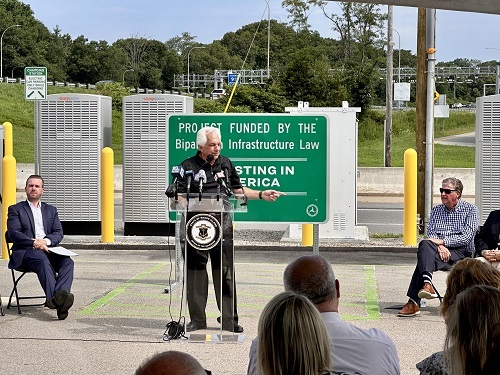The Rhode Island Department of Transportation recently helped host a ribbon-cutting event at the Route 117 Park & Ride in Warwick to celebrate Rhode Island becoming the first state in the nation to complete Phase 1 of the alternative fuel corridor established by the National Electric Vehicle Infrastructure or NEVI formula funding program.
[Above photo by AASHTO]
The $5 billion NEVI program and $2.5 billion Charging and Fueling Infrastructure or CFI discretionary grant program – both funded by the Infrastructure Investment and Jobs Act or IIJA – seek to help states build out a network of EV chargers across the country.
The Federal Highway Administration approved all the EV charging plans submitted by the states, Puerto Rico, and the District of Columbia in September 2022 and RIDOT noted that Rhode Island has been allocated a total of $22.9 million from the NEVI program over a five-year period to support construction of EV chargers.
“The completion of NEVI Phase 1 marks a milestone moment in Rhode Island’s commitment to a greener and more sustainable future, “said Governor Dan McKee (D) in a statement.
“By creating the infrastructure for cleaner transportation alternatives, we’re not only working towards our ‘Act on Climate’ goals but leading the charge to decrease our carbon footprint,” he said. “I’m grateful to the private and public partners who came together on this project that demonstrates our state’s continued commitment to enhancing our state’s EV charging infrastructure and the green economy.”
Currently, there are a total of eight Level 3 Direct Current Fast Chargers or DCFCs and six Dual-Port Level 2 charging stations strategically located along the Alternative Fuel Corridor on Interstate 95 in Rhode Island.
That network of highway-adjacent EV chargers offers efficient and convenient recharging options that enable EV users to embrace EV travel with confidence, explained Peter Alviti, RIDOT’s director, at the event.
“Rhode Island is ahead of the curve in providing the infrastructure for not only electric vehicles but also plug-in hybrid electric vehicles,” he explained.
“With the completion of phase one, and with our coordinating charging stations in Massachusetts and Connecticut, we can proudly say that electric vehicle owners can cross our state with confidence,” Alviti added. “And we can say that our infrastructure gives potential EV purchasers a reason to buy and drive EVs and plug-in hybrid electric vehicles.”
RIDOT noted that it plans to begin work on Phase 2 of the NEVI program this fall, further expanding EV charging infrastructure across public roads and other accessible locations statewide.

